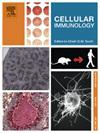Modular activation of macrophage-like cells by beta-2-microglobulin via mitochondria and the cGAS-STING pathway
IF 2.9
4区 医学
Q2 CELL BIOLOGY
引用次数: 0
Abstract
Beta-2-microglobulin (β2m) is a component of the major histocompatibility complex class I. β2m is released into cellular fluids in response to various stimuli, including pro-inflammatory cytokines. Elevated β2m levels have been found associated with autoimmune diseases such as rheumatoid arthritis, systemic lupus erythematosus, and Crohn's disease, as well as in various hematological cancers and viral infections. Despite an established correlation between immune activation of especially monocytes and macrophages, and circulating β2m levels, the causative relationship remains unclear. Here, we investigate the effects of exogenous β2m and a complement C1s cleaved form, dK58β2m, on two murine macrophage-like cell lines J774 and RAW. We demonstrate that β2m, and to a greater extent dK58β2m, can affect mitochondrial activity. Furthermore, the presence of IFN-γ amplifies the effect, causing altered bioenergetics, and increased production of mitochondrial reactive oxygen species and nitric oxide. In addition, we found activation of the cGAS-STING pathway by β2m and dK58β2m in the presence of IFN-γ. Only dK58β2m in combination with IFN-γ caused apoptosis and cell death. Our findings highlight the modular nature of a β2m-induced macrophage response, potentiated by dK58β2m and IFN-γ, and provide information on the underlying mechanisms responsible for the immune activation properties of β2m.

β -2微球蛋白通过线粒体和cGAS-STING途径模块化激活巨噬细胞样细胞
β -2微球蛋白(β2m)是主要组织相容性复合体i类的一个组成部分。β2m在各种刺激下释放到细胞液中,包括促炎细胞因子。已发现β2m水平升高与自身免疫性疾病,如类风湿关节炎、系统性红斑狼疮和克罗恩病,以及各种血液学癌症和病毒感染有关。尽管免疫激活(尤其是单核细胞和巨噬细胞)与循环β2m水平之间存在明确的相关性,但致病关系尚不清楚。在这里,我们研究了外源性β2m和补体C1s切割形式dK58β2m对两种小鼠巨噬细胞样细胞系J774和RAW的影响。我们证明β2m,以及在更大程度上dK58β2m可以影响线粒体活性。此外,IFN-γ的存在放大了这种效应,导致生物能量学的改变,并增加了线粒体活性氧和一氧化氮的产生。此外,我们发现在IFN-γ存在下,β2m和dK58β2m激活了cGAS-STING通路。仅dK58β2m与IFN-γ联合引起细胞凋亡和死亡。我们的研究结果强调了β2m诱导的巨噬细胞反应的模块化性质,由dK58β2m和IFN-γ增强,并提供了有关β2m免疫激活特性的潜在机制的信息。
本文章由计算机程序翻译,如有差异,请以英文原文为准。
求助全文
约1分钟内获得全文
求助全文
来源期刊

Cellular immunology
生物-免疫学
CiteScore
8.20
自引率
2.30%
发文量
102
审稿时长
30 days
期刊介绍:
Cellular Immunology publishes original investigations concerned with the immunological activities of cells in experimental or clinical situations. The scope of the journal encompasses the broad area of in vitro and in vivo studies of cellular immune responses. Purely clinical descriptive studies are not considered.
Research Areas include:
• Antigen receptor sites
• Autoimmunity
• Delayed-type hypersensitivity or cellular immunity
• Immunologic deficiency states and their reconstitution
• Immunologic surveillance and tumor immunity
• Immunomodulation
• Immunotherapy
• Lymphokines and cytokines
• Nonantibody immunity
• Parasite immunology
• Resistance to intracellular microbial and viral infection
• Thymus and lymphocyte immunobiology
• Transplantation immunology
• Tumor immunity.
 求助内容:
求助内容: 应助结果提醒方式:
应助结果提醒方式:


